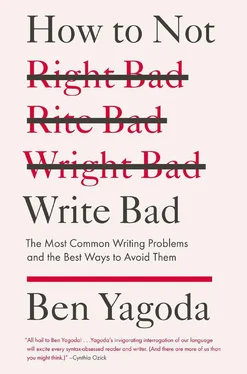[ Because the peppercorns were contaminated (1) with the bacteria, a recall was issued (2) on all of the contaminated salami. 1.3 million pounds were recalled (3). The product was destroyed (4) under supervision by specialists. ] *
In my judgment, 1 is fine, 2 is bad, and the last two are borderline. But the passage can only sustain one passive, so I would get rid of 3 because it’s easily changed. So a possible rewrite could be.
The Centers for Disease Control issued a recall on all contaminated salami, and eventually, 1.3 million pounds were recalled. CDC specialists destroyed the meat.
9. WHAT THE MEANING OF “IS IS” IS
Redundant is almost always hurled as a negative epithet indicating repetitiveness or tautology, but it can be an effective rhetorical device. Shorn of all redundancy, Shakespeare’s “most unkindest cut of all” would be pretty vanilla and the ad slogan “Raid Kills Bugs Dead” would become the ho-hum “Raid Kills Bugs.” Meanwhile, Gertrude Stein’s “Rose is a rose is a rose is a rose” would have to be completely erased because the quotation is nothing but redundancy. ( Completely erased is redundant as well — something is either erased or it isn’t. But I felt like I needed the emphasis provided by completely. )
Most of the time, however, redundancy is mindless and bad, an instance of a writer reflexively putting down multiple words all denoting the same thing. It’s tough to prove, but I have little doubt that redundancy is on the upswing, a manifestation of the wordiness and clunkiness that characterizes much writing these days. An example — in spoken English, certainly — is the phrase is is. A second is is usually (though not always — see the fourth word of this sentence) both redundant and superfluous. I just searched the phrase is is on National Public Radio’s Web site and was presented with 1,810 hits. The most recent are:
And the media loves those hundred-million-dollar numbers. The reality is is that it’s worth a lot less—35.5 million guaranteed. (Sports correspondent Stefan Fatsis, on All Things Considered. )
But the truth is, is it’s no longer insurance if the government says they’re always going to bail you out. (Representative Ron Paul, on Talk of the Nation. )
The big difference is, is that right now farmers — and other employees, actually, too — are not required to verify the information. ( Milwaukee Journal Sentinel reporter Georgia Pabst, on Tell Me More. )
And, to go to the other side of the political spectrum, here’s a question from Fox News’s Greta Van Susteren that’s not only redundant, it’s not a question:
The second question is, is that the Wall Street Journal is a very sort of elite big corporate-type newspaper, lots of money.
Maybe that extra word seems like a hedge against misunderstanding, or maybe it just comes along with the prolixity of the age. In any case, it should go.
I have started to note, in my students’ work and in all sorts of published work, the blooming of a lot of other phrases that are equally redundant, though not as obviously so.
[ My mouth continued to remain open. ]
My mouth remained open.

[ We’re celebrating our two-year anniversary next week. ]
We’re celebrating our second anniversary next week. ( Anniversary has the same root as annual and implies a commemoration of a certain number of years . That said, it’s okay to use phrases like two-month anniversary, if you really must.)

[ I really appreciate the effort put in by my fellow classmates. ]
I really appreciate the effort put in by my classmates. ( Fellow countrymen, fellow colleagues, and fellow teammates are similar redundancies that need to lose the fellow. )

[ The rules apply to both men and women alike. ]
The rules apply to men and women alike.

[ The play is well written, but yet it contains far too many clichés. ]
The play is well written, but it contains too many clichés.
Even still to start a sentence ( Even still, the wedding was a success ) is kind of a redundancy in that it welds together two synonymous expressions— even so and still. They are both fine; pick one.
10. TONE
Imagine that you’re invited to a pool party and you wear a formal gown. Or you’re invited to a fancy wedding and you wear madras shorts and a Philadelphia Eagles jersey. In each case your ensemble may be perfectly matched and generally speaking spot-on, but all wrong for the occasion.
The same goes for writing. Each form or genre you will work in has its own stylistic dress code, another word for which is register. Some of the variables are word choice, length of sentence, length of paragraph, and relative comfort with contractions and with a conversational tone, or even slang. There are subtle variations even between similar genres. Newspaper reporters favor short words and paragraphs, but a fairly formal tone: they wouldn’t would not employ use contractions. Magazine writers, on the other hand, are fond of long sentences and paragraphs, and a conversational tone that can veer off into the breezy and slick. And in an academic paper or book, it is expected that the writer will potentially proceed in violation of virtually all the precepts outlined in this volume! But no exclamation points allowed.
To avoid being that person in the loud shorts, it’s necessary to case the joint in advance. That is to say, read the best practitioners in the genre you want to contribute to. Maybe even copy down some of their sentences and paragraphs. Eventually you’ll get a feel for the expectations, and start to dress the part.
D. Sentence to Sentence, Paragraph to Paragraph
So can I assume we’re all good on sentences? Mazel tov! As we move on to subsequent sentences, and then paragraphs, the key issues are cadence or rhythm, variety, novelty, consistency, and transitions.
The first two (and a lot else besides) are taken up in the beginning of one of my all-time favorite quotes about writing, from the pen of the critic F. W. Bateson. I like the rest of the quote, too, so here’s the whole thing:
[The] defining characteristics of good prose [are]: a preference for short sentences diversified by an occasionally very long one; a tone that is relaxed and almost colloquial; a large vocabulary that enjoys exploiting the different etymological and social levels of words; and an insistence on verbal and logical precision.
Relatively short sentences should be the default, as Bateson suggests, but too many of them in a row produces a staccato ersatz-Hemingway sound, or a dumbed-down Dick-and-Jane sort of thing. Not only will you be able to hear this when you read them aloud, but you can learn to literally see the problem — the short sentences will jump out at you. To fix this, just link the sentences together with commas, conjunctions ( and, but ), and/or logical connectors like although, after, or because.
[ The store will open its doors tomorrow. Baseball star Albert Pujols will give a speech. The first ten customers will receive signed baseballs. ]
Читать дальше













